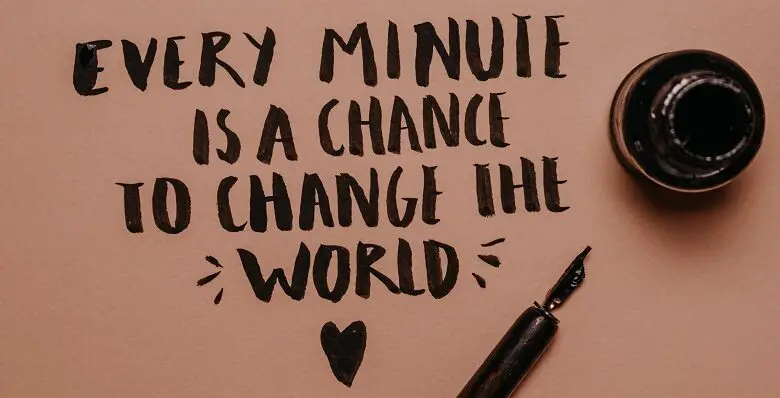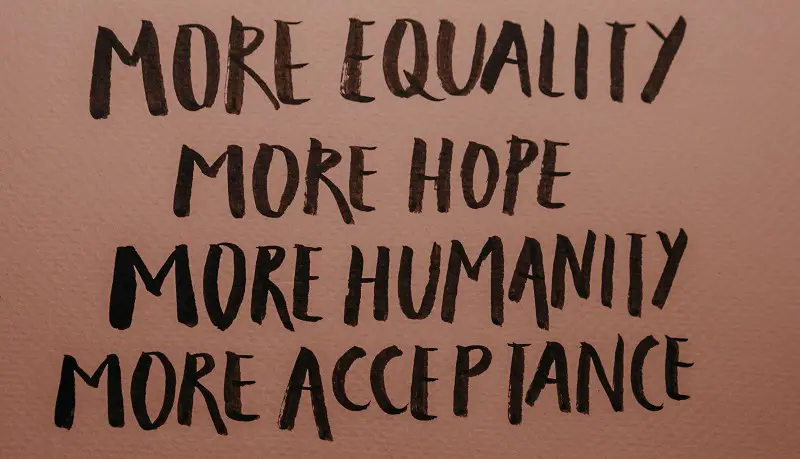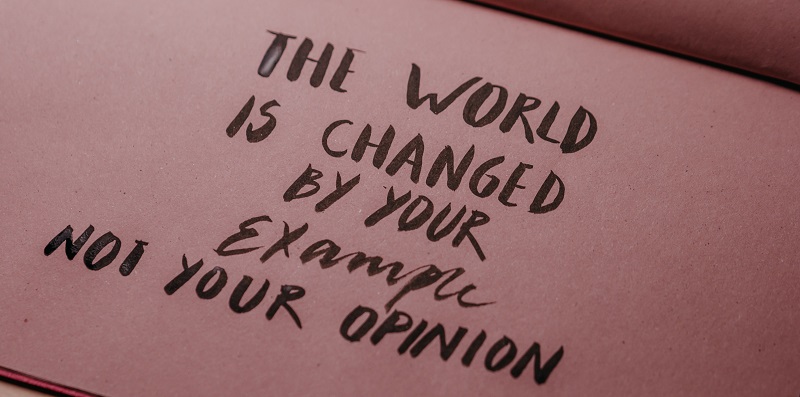
10 things we want for disabled people in the next 10 years
As part of Disability Horizons’ 10th birthday celebrations, we asked our team and community of readers what they’d like to see improve or change for disabled people in the next 10 years.
Ideas include better accessibility, more representation across all sectors, affordable assistive technology and products, and no more prejudice or disability hate crime.
What do you want? Tell us on Facebook and Twitter @DHorizons using the hashtag #10yrsofDisabilityHorizons.
1. Access everywhere and better information about accessibility
We’re sure you would all agree that one of the things we need is full accessibility everywhere. We want an end to worrying about whether a building, public space or transport is accessible or not.
Our content editor and writer, Lucy Currier, would love to see a time when we no longer have to call up places to check the accessibility, or be faced with an inaccessible building when we have been told it is ‘accessible’.
Even better, imagine being able to spontaneously visit somewhere, anywhere, and get in with no worries.
Plus, because everyone has different requirements, there should always, without question, be more detailed accessibility information so that disabled people can plan ahead if they need to.
AccessAble, Access Rating, Access Advisr and Blue Badge Style have access reviews for thousands of places across the UK, but the hope for the next decade is all public buildings and venues globally can provide access information.
2. Disability representation in all fields
Not only do we want more disabled people in employment – we all know that unemployment is much higher for disabled people than our non-disabled peers – but we also want to have more disability representation in all industries.
This includes everything – the arts, hospitality, journalism, housing, teaching, science, medicine, law and politics.
Our writer, Raya Al-Jadir, believes that more disability representation across the board, but particularly in certain jobs, will ensure better support is available for disabled people to enable us to live our lives without restriction.
For instance, a doctor with a disability or health condition themselves will be more empathetic and understanding toward their disabled patient’s needs.
A disabled politician can raise the voices of disabled people in their constituency or local authority, making changes that really matter and affect us.
Equally, simply seeing more disabled people in all types of jobs and situations will make society more inclusive.
3. No more judgement, prejudice or disability hate crime
 One of the biggest challenges we as disabled people face is achieving full equality and acceptance throughout society.
One of the biggest challenges we as disabled people face is achieving full equality and acceptance throughout society.
Raya Al-Jadir would like to eventually see the removal of judgements towards disabled people, those with health conditions and their families before knowing their story.
So many disabilities are hidden, everyone’s situation is different and we all have such different experiences – you can never truly know what someone is going through from just looking at them.
Sadly, we’ve probably all had some experience of prejudice and people’s misconceptions. But for some, this can be much darker and in the form of disability hate crime.
Freddie Stebbing, who works on our social media channels, hopes that in the future people who commit this horrible act will actually be brought to justice. Even better though, we’d all love to see hate crime eradicated altogether.
You can read our article on disability hate crime, which sadly highlighted that the crime has risen, and discover people’s personal experiences of the crime.
4. More quality and flexability with social care support
Many of us rely on PAs and carers to support us in everyday tasks, such as personal care, cooking, housework and travelling.
However, we are often limited in the amount of care we are provided with or have been supported by inadequate or unsafe carers.
Since our writer Emma Purcell moved into her own home four years ago, she has had assistance from countless carers that have been unsuitable.
Problems have included poor language skills, lack of common sense or reluctance to carry out certain tasks (for example, attending concerts) – you can read her article about 10 bizarre experiences with her carers to find out more.
Because of this, she has become dependent on her parents for support and may return to her parent’s home as a result.
More needs to be done to make sure PAs and carers have the proper qualifications and training and understand that caring for a working-age adult is completely different to an elderly client.
Journalist Michael McEwan is chair of a campaign called Stay Up Late Scotland, which is fighting for the right for adults with a disability to stay up late and not have support workers limit their time or make them have a specific bedtime.
Why, as an adult, should a disabled person be treated as a child? It’s not right and it needs to change.
5. Accessible and affordable technology, mobility aids and products
The right product or gadget can really transform your life as a disabled person. We know this is the case for many disability-specific products, having seen first-hand through our Disability Horizons Shop.
But we need more of these products. We need more innovation, more variety and more designs that are perfectly suited to different types of needs, ensuring that no one is left out and everyone can live easier.
There should also be more multi-purpose mobility aids for different disabilities. For instance, our editor Karen Mogendorff, who has cerebral palsy and sometimes needs assistance from a wheelchair, would like to see a device that can be used as a wheelchair and a walker combined.
There is also an argument that all products and technology should be made accessible, regardless who they are for.
Driverless cars, for example, something that may become widely available to the general population, could be accessible to blind people, those with mobility issues or older people.
If all products are made with accessibility in mind, then they benefit everyone. This, in turn, helps to make products more affordable as they’re produced on a wider scale and are no longer niche and expensive.
And as our ageing population continues to grow, many more people will become disabled in some way and rely on accessible technology, mobility aids and adaptive products, so it’s a win, win situation.
Take a look at our article on improving access to assistive technology for everyone through a project spearheaded by the World Health Organisation.

6. Housing all accessible from the get-go
In a similar vein, all housing should be accessible, full stop. Finding accessible housing or making your current home accessible following injury, illness or old age is always challenging.
However, there is a simple solution to resolve these issues – make houses accessible from the get-go.
When building new properties, they should already have level access, ramps, downstairs bedroom and wet room, wider doorways and/or lifts.
Plus, smart home technology, such as electric door and window openers, smart lighting, smart heating, smart blinds and camera doorbell should be considered too.
As with products, if everything is made accessible from the start, it will benefit everyone.
If you’re in the process of looking for a new home, download our FREE guide to finding an accessible home for all you need to know.
If you are looking to adapt your current home, find out whether an accessible modular extension could be the answer.
7. Make virtual working, learning and events more common
One positive to come out of the coronavirus pandemic is that society has proven that virtual working, learning and events and much more are possible.
This is a huge lifeline for anyone with a disability or health condition that has difficulty travelling or accessing places, or who is unable to regularly leave their home.
Emma Purcell has benefited from attending multiple online courses, webinars and masterclasses over the past year, some of which would usually have taken place at inaccessible venues far away from where she lives.
We hope virtual events will continue post-Covid so that we can have more access to home working, education and entertainment, saving valuable time travelling and relying on PAs.
If you’re interested in online learning or virtual experiences, visit our articles on 8 virtual courses to up your skills and 18 places to ‘travel’ to from your home.
8. Interconnected working with health and social care services
As disabled people, we need support from a range of health and social care professionals – it is sometimes the nature of our condition.
But it can be tricky making sure everyone is up to date on your individual needs, especially when this is within different departments or even different organisations.
We would like to see an interconnected online programme or app that enables GPs, consultants, physios, OTs, wheelchair services, social workers, parents and carers to check everything they need to know about a disabled person’s health and wellbeing.
Our shop manager, Duncan Edwards, has been trialling an interconnected service called Rix Wiki for his son who has physical and learning disabilities. Fingers crossed this type of service is successful and can be rolled out more widely.
9. More disability representation in mainstream media
There is an ever-widening number of actors, characters, comedians, journalists and presenters with disabilities in the media, but we know that more representation is still needed.
We need to see people of all different types of disabilities and conditions. We need to see disabled actors play not only disabled characters but non-disabled ones too. And we need to see disabled characters represented in a way that doesn’t focus solely on their condition.
We also need to see more disability across magazines, news broadcasts, radio programmes, documentaries, reality shows, podcasts and more. Michael McEwan told us he would like to see more disabled people on panel shows talking about non-disability issues as well as disability issues.
Tracy Williams, who lives in the USA, would like to see the media do more interviews directly with people who have disabilities rather than depicting close friends, family members and mentors. This may reframe the picture society has of living with a disability.
Visit our entertainment and culture section to read all our interviews with disabled celebrities, including Rosie Jones, Jules Robertson, Mark Lane, RJ Mitte, Sophie Morgan and Chris McCausland.
10. More disability organisations, not just charities
In the next 10 years, we would like to the stigma or feeling that disabled people need charity removed for good.
Many disability-related organisations are indeed charities. Although in many ways they are helpful, this creates a sense of pity and feeling that disabled people need help.
As we always say, disabled people are no different to anyone else, we just might do things a little differently. Society should be embracing our skills and achievements instead of ignoring them.
If we’re enabled to live, work and love like everyone else, rather than treated as different or in need, we are empowered in the process and society as a whole benefits.
Here at Disability Horizons, we’ve occasionally been mistaken for being a charity, when in fact we’ve always been a limited company. For us, it’s always been important that we prove that disabled people are talented, very much employable and capable of achieving whatever they desire.
What other things would you like to see happen for disabled people in the next 10 years? Share your thoughts in the comments box or on Facebook and Twitter @DHorizons and use the hashtag #10yrsofDisabilityHorizons.
By Disability Horizons
More on Disability Horizons…